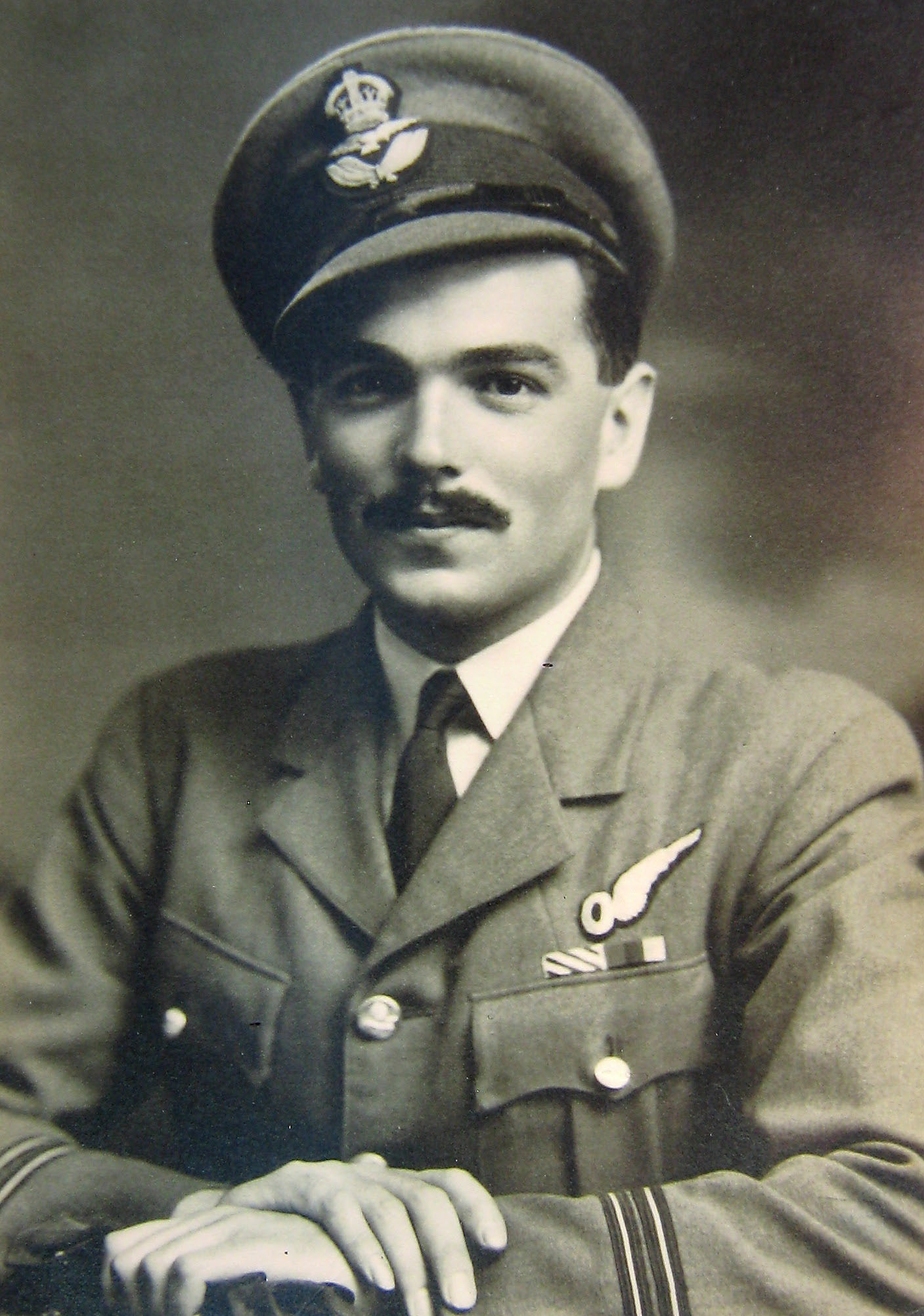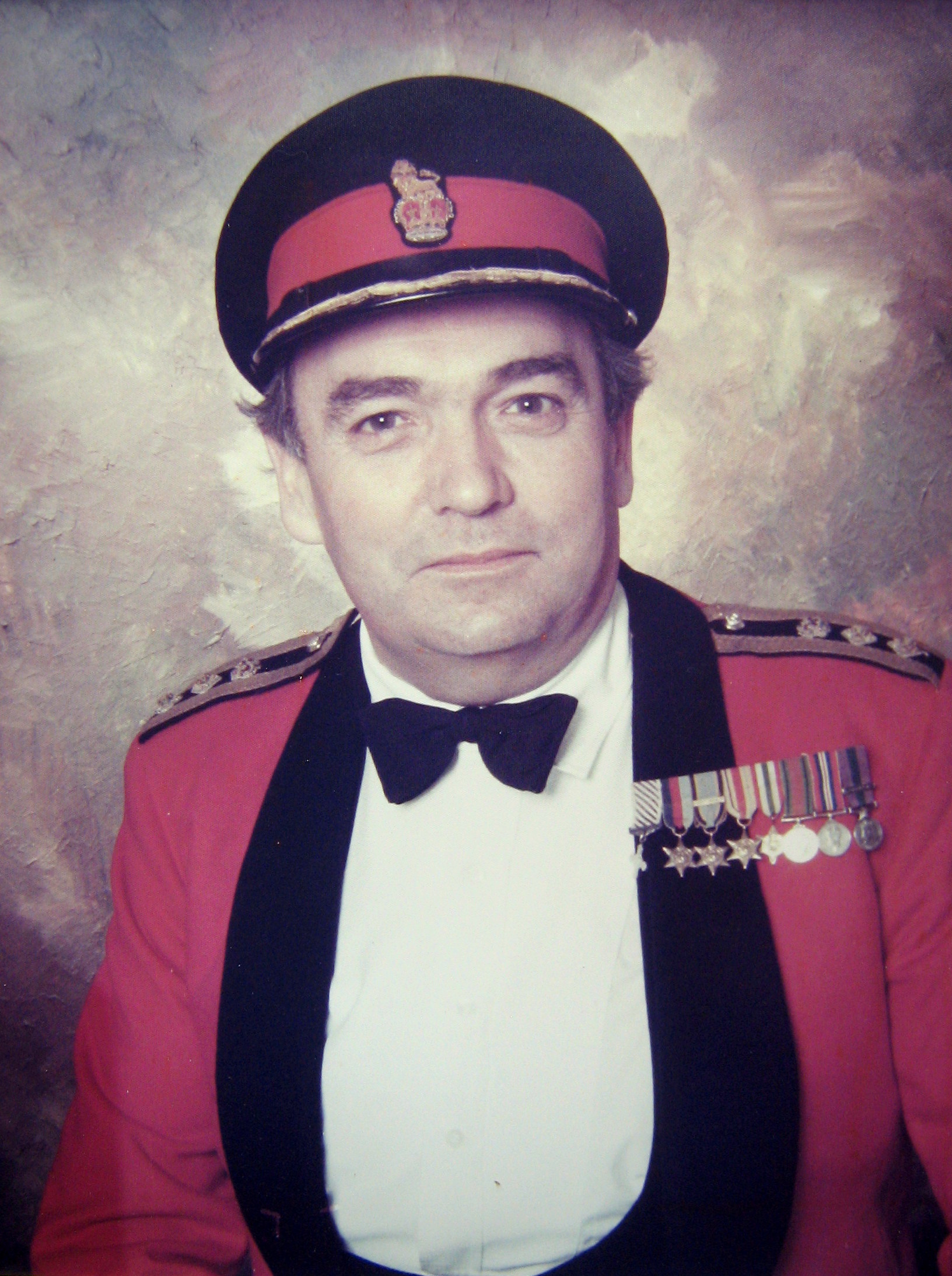Colonel Roddy McKitrick DFC
It was just after midnight on Saturday 9th September 1944 when Short Stirling LK200 NF-J last took off from RAF Tempsford in Bedfordshire. Described by Hitler as a “viper’s nest”, Tempsford was the RAF’s most secret airfield. The Stirling, with a seven-man crew, belonged to 138 (Special Duties) Squadron and on board were weapons, carrier pigeons and two SOE agents destined for a drop-zone north east of Amsterdam. Heading out alone over the North Sea, the aircraft encountered stormy weather with heavy rain. Only the skill and teamwork of the navigator, then-Flying Officer Roddy McKitrick, and pilot ensured that the target was reached.

The pilot, Squadron Leader Geoff Rothwell DFC & Bar, recently recalled, “Roddy and I became acquainted in 1944 when we joined 138 Squadron. I was looking for a navigator and I saw this young flying officer, barely out of his teens, with a DFC. I heard reports of his skill in Bomber Command, so he became my navigator. The meticulous way Roddy worked was often demonstrated. If you strayed more than a few degrees off course you would be told in no uncertain terms. He was the finest navigator I ever flew with.”
On completion of the drop, the aircraft headed north and descended to low level to avoid enemy radar and coastal defences. However, as it crossed the inland waters, it struck the cable of a barrage balloon, or maybe even a mast. Geoff Rothwell, with the assistance of Roddy, who was now seated in the co-pilot’s seat, wrestled the badly-damaged aircraft to a greater height and, with much skill, managed to crash-land on the island of Texel.
Sadly, three of the crew, Flying Officers Court DFC, Hulme and Walton DFC BEM, were killed by the impact, but the remaining four members survived, including Roddy with a broken ankle. Although taken into hiding by a Dutch farmer, Roddy, realising that he required urgent medical attention and not wishing to risk the lives of sympathetic locals, requested the Wehrmacht be notified. The occupying German troops, already alerted by the crash, soon arrived from the mainland to take the survivors into captivity. Roddy spent some weeks recovering from his injuries under the care of German nursing nuns, before joining Geoff Rothwell as a POW at Stalag Luft 1 at Barth on the Baltic coast.
Roderick Alexander McKitrick (also widely known as “Mac”) was born at Whitehead, County Antrim on 14th March 1922, son of George Evelyn McKitrick (of the Belfast Banking Company) and Margaret “Daisy” McKitrick (nee Woods). A bright child, of a forceful and independent nature (which he would retain into adulthood), he was largely tutored at home. Upon matriculation, he briefly followed his father into banking but, with the war already started, he soon volunteered for service, initially in an air defence unit of the Honourable Artillery Company deployed in the London area.
With the call for more aircrew in 1941, Roddy transferred from the Army to the RAF to train as a navigator. Upon completion of training, he joined 44 (Rhodesia) Squadron, the first squadron to convert completely to Lancasters. He had served two full operational tours with 44 Squadron before joining 138 Squadron; by the time of his capture, he had completed 68 missions with Bomber Command.
Following repatriation from POW camp in May 1945, Roddy, promoted to flight lieutenant, soon found himself back in Germany with a team seeking out the graves of RAF aircrew. Here he met Irene Grace (nee Gale), originally from South Wales, who was working for the United Nations Relief and Rehabilitation Administration (UNRRA) in the American zone. They married in December 1947 at the British Consulate General in Hamburg.
Returning to Northern Ireland upon discharge from the RAF in 1948, Roddy exploited the linguistic skills honed as a POW by taking up a place at Queen’s University Belfast to study Modern Languages, graduating BA in 1953. Simultaneously, he oversaw the design and building of his first house, a theme to which he would return in later life. Graduation brought him back into the Forces, with a commission in the Royal Army Educational Corps (RAEC). At the time the Corps was attracting numerous decorated veterans still wishing to enjoy the service life but seeking a less hazardous occupation.
Promotion to captain, then major, soon followed, with numerous postings around the United Kingdom and to HQ FARELF in Singapore. Travel to the Far East was by troopship, soon to be replaced by aircraft. As the senior “schoolie”, Roddy was tasked to run the on-board lessons to keep all school-age children occupied throughout the voyage – not too popular as it was during August, though he made a good ice-cream salesman at break-time.
He finally returned to Germany in 1968 on taking up the appointment of Senior Education Officer at HQ 2nd Division in Lübbecke as a lieutenant colonel. The local Anglo-German association flourished under Roddy’s stewardship and, following a posting to HQ Southern Command at Wilton, he was subsequently rewarded with the post of Commandant of the Higher Education Centre, Germany at Mülheim. The HEC was entrusted with German language training and preparing junior officers for the staff/promotion examination. Throughout this time, he routinely attended top-level NATO conferences as an interpreter in both French and German.
A spell at HQ Scotland in Edinburgh was cut short by promotion to colonel and a final posting to HQ South East District in Aldershot. This tour was also curtailed when the opportunity arose to return to Germany with the Joint Services Liaison Organisation as a civil servant. Resettlement training by the Army in 1976 included attendance on the infamous bricklaying course; thereafter, Roddy missed no opportunity to build a wall or lay concrete, whether at home or visiting relatives.
Five happy and fulfilling years as Services Liaison Officer in Osnabruck completed Roddy’s working life, but he remained active even after retirement in 1981. Skiing, windsurfing – which he took up in his late fifties – and, above all, travelling filled his time. Not content to tour at leisure, each trip required detailed planning, often lasting much longer than the journey itself, and mirroring his wartime role as navigator. When one of his sons lived in New Jersey for two years in the early 1990s, Roddy, accompanied by Irene, took the opportunity to travel extensively by car throughout the United States and Canada, covering thousands of miles in his quest to visit all states and provinces.

With the reunification of Germany in 1990, access to Stalag Luft 1 at Barth became much easier. As a fluent German speaker, Roddy facilitated and attended a number of gatherings by ex-POWs at the site of the camp, where they were warmly received by the local community.
As arthritis, and his wife’s patience, eventually restricted the time he could spend driving, he took to the seas. Numerous cruises took them to all corners of the globe, only easing up as he entered his eighties.
The huge discontinuity of a major war in completely rerouting people's lives can often open up avenues never previously envisaged. In allowing him to reach a level of fulfilment he would never have found as a school leaver entering the civilian world of banking, this was surely true for Roddy.
Following a long illness, Roddy McKitrick died peacefully at home in Salisbury on 24th April 2014. He is survived by his wife, two sons and a daughter: Stuart, who followed him into the Army; Karen, who married into the Army; and Julian, a businessman, who has long been settled in Germany and, coincidentally, lives almost within sight of the interrogation centre at Oberursel to which all allied aircrew were taken following capture.
Back to list
Top of Page